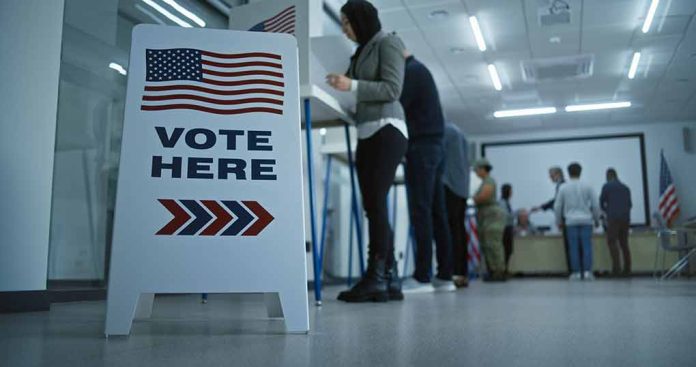
In a resounding blow to non-citizen voting rights, the House of Representatives voted 266-148 to nullify Washington D.C.’s law allowing non-citizens to vote in local elections, with 56 Democrats breaking ranks to support the Republican-led measure.
Key Takeaways
- The U.S. House voted 266-148 to repeal Washington D.C.’s 2022 law allowing non-citizens to vote in local elections, with 56 Democrats joining Republicans.
- The bill, introduced by Rep. August Pfluger, argues that allowing non-citizens to vote dilutes citizen voting power and potentially enables foreign influence in elections.
- Under the DC Home Rule Act of 1973, Congress has the authority to overturn local DC laws, though this power hadn’t been used for over 30 years until 2023.
- The House also passed a second bill addressing police protections in D.C., while delaying action on the district’s $1.1 billion budget shortfall.
- Previous attempts to overturn the non-citizen voting law were blocked by Democrats, but the newly Republican-controlled Senate increases the chances of success.
House Moves to Protect Election Integrity in Nation’s Capital
The Republican-controlled House of Representatives has taken decisive action to safeguard voting rights in Washington, D.C., passing legislation that would prevent non-citizens from casting ballots in local elections. The vote of 266-148 revealed significant Democratic support for the measure, with 56 Democrats crossing party lines to join Republicans in opposition to the D.C. law that allowed non-citizens to vote after just 30 days of residency in the district. The bill directly targets the 2022 Local Resident Voting Rights Amendment Act, which Republicans argue undermines the sanctity of American elections.
“Free and fair elections are a prerequisite for a healthy republic. The radical DC Council’s decision to allow noncitizens—including illegal aliens and foreign agents—to vote in local elections dilutes the voting power of the citizen voter,” said Rep. August Pfluger, who introduced the legislation.
Constitutional Authority and District Governance
The legislation relies on Congress’s constitutional authority over the District of Columbia, granted by the DC Home Rule Act of 1973. While this power allows federal lawmakers to overturn local DC laws, it had remained largely unused for over three decades until 2023. The current Republican majority has shown renewed interest in exercising this oversight, particularly regarding issues they view as threats to election integrity and national security. Republican lawmakers have expressed particular concern about foreign embassy personnel potentially voting in local elections, creating avenues for foreign influence in American governance.
“The right to vote is a defining privilege of American citizenship. Diluting that right by extending it to non-citizens — whether here legally or illegally — undermines the voice of D.C. residents,” said Rep. James Comer, emphasizing the constitutional principles at stake.
Broader Republican Legislative Agenda
The vote on non-citizen voting represents just one part of a broader Republican effort to address governance issues in Washington, D.C. The House also passed the “Protecting Our Nation’s Capital Emergency Act,” which addresses law enforcement liability protections for the Metropolitan Police Department. This measure aims to address critical understaffing issues and has garnered support from the DC Police Union. Additionally, lawmakers are expected to consider the “District of Columbia Federal Immigration Compliance Act,” further targeting D.C.’s immigration policies. These actions reflect President Trump’s emphasis on law enforcement support and immigration control.
“D.C.’s City Council made radical decisions in our nation’s capital under the Biden-Harris administration, passing local laws that are woefully inconsistent with national standards or constitutional principles,” said Rep. August Pfluger, highlighting the need for congressional intervention.
Democrats Divided Over D.C. Autonomy
The vote has exposed significant divisions within the Democratic Party regarding the balance between federal authority and local governance. While many Democrats continue to advocate for D.C. statehood and greater autonomy, 56 of their colleagues broke ranks to support the Republican measure. This split reflects the complex politics surrounding the unique jurisdictional status of Washington, D.C. Meanwhile, local leaders, including Mayor Muriel Bowser, have expressed frustration over congressional interference, particularly as House leadership continues to delay addressing a critical $1.1 billion budget shortfall facing the district despite Senate and presidential support for a fix.
“If D.C. wants illegals to vote, we’ve made it clear at the federal level people here illegally should not vote in any elections,” said House Majority Leader Steve Scalise, reinforcing the Republican commitment to securing American elections.
Path Forward for Election Integrity
With Republicans now controlling both the House and Senate, the bill faces much stronger prospects than previous attempts to overturn D.C.’s non-citizen voting law. Previous efforts were blocked by the then-Democrat-controlled Senate, but the new Republican majority significantly increases the likelihood of success. The legislation represents a commitment to preserving the value of American citizenship and ensuring that voting rights remain a privilege reserved for citizens. This principled stance on election integrity reflects conservative values that recognize voting as a foundational right of citizenship that should not be extended to non-citizens, regardless of immigration status.
“Anyone who voted against this legislation voted for the transfer of political power away from legal voters. With the House passage of my legislation today, we are one step closer to restoring the sanctity of the voting process to ensure that only American citizens are voting in our nation’s capital,” said Rep. August Pfluger.




